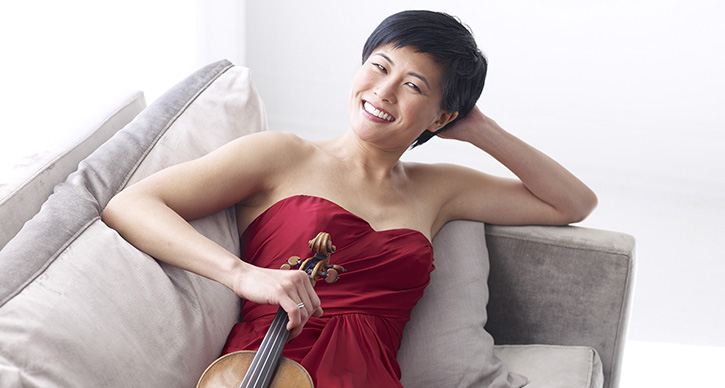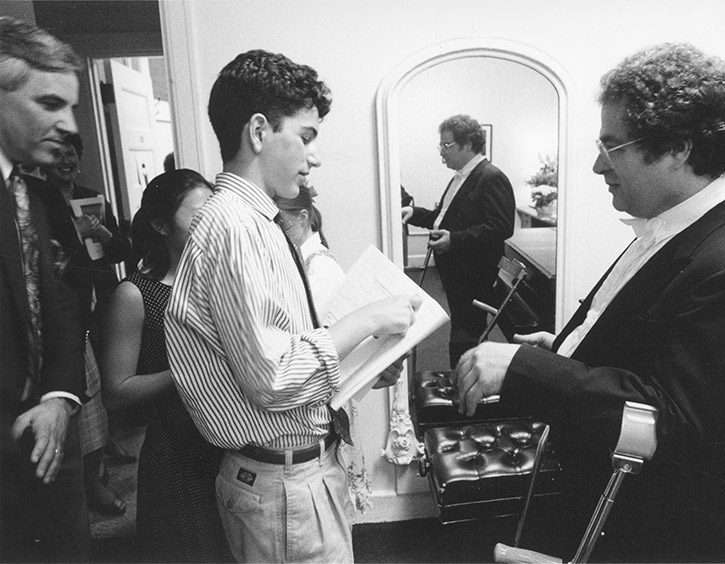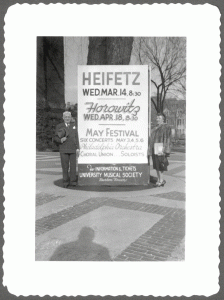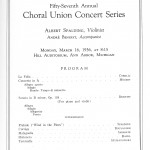Jennifer Koh performs 2/6
Ken Fischer tells us about Jennifer Koh’s upcoming performance in Ann Arbor. Interested in going to the concert? Get more info: http://bit.ly/1rp7IPd
Artist Interview: Jennifer Koh, violinist
Insightful and passionate violinist Jennifer Koh talks with UMS Lobby contributor and composer Garrett Schumann about creative programming choices, contemporary works, and the power of music.
The virtuoso violinist returns to Ann Arbor (following her 2012 appearance in the Philip Glass and Robert Wilson opera Einstein on the Beach) with the third and final part of her Bach and Beyond series on Friday, February 6, 2015.
Garrett Schumann: Throughout your career you’ve maintained a consistent interest in programming contemporary and often newly-commissioned works alongside standard pieces in the violin repertory. Where did this passion for combining tried-and-true pieces with new pieces come from in your development as a violinist?
Jennifer Koh: I think it was always just curiosity. When you first make your foray into discovering classical music, it’s really new to you. Now, to me, it doesn’t really matter what time period the music comes from, whether it is “new” or “old.” The one thing that has been such a great pleasure about working with contemporary music is that I can actually get to meet and work with living composers, and that has been a really wonderful, beautiful part of doing the work.
GS: Do you think that putting older pieces next to contemporary work brings new things out of them?
JK: Everything is in context. We live in a certain age, and every day that passes takes us one day further away from the society of Bach, for example. I actually remember hearing a program by Peter Serkin. This program was a little unusual for him; he was doing all the Bach concerti, and what was fascinating was that everything sounded so modern. I realized that art is about re-discovering.
When I first created the Bach and Beyond program, I bookended the program with Bach because I wanted to create a journey through history and into our contemporary landscape and then return to Bach. You create this circular journey, and you realize that the experience of listening to the things in the middle changes how you hear Bach. And, in a way, it also changes how you frame each of the composers.
I feel that contemporary music links us to the past because it does have this history. Most composers work within the richness of that tradition, but they also add their personal viewpoint to it. The great thing about art, and the great pleasure for me personally as a musician, is that it has the ability to change the world. It creates a situation where people can have a space to be very present, but also go to places that they normally don’t want to go to and access those emotions that they don’t necessarily experience every day.
GS: Speaking of this sort of cyclical nature of Bach and Beyond, what’s really interesting about your performance this season is that when you did your first UMS performance in 2010, you were at the beginning of the Bach and Beyond series. Now that it’s coming to a close, how does that feel?
JK: It’s been an interesting process. I actually remember the very beginning, when it was still very difficult to convince people to do this solo violin program. And I remember when I first came up with the idea, a lot of people said, “Nobody’s going to want to book that.” Nobody does solo violin programs. But now, Bach and Beyond has become much more accepted, so one of the beautiful things for me has been that people have begun to see violin as an instrument that has enough timbre to hold an entire program.
I was also at UMS with Einstein on the Beach, and that experience opened my world in a wonderful way. Those performances were the first preview performances of Einstein, and the first extensive rehearsal process was there. It feels like UMS has been a starting point, and so it’s nice for me to return.
GS: What was the experience of working with director Robert Wilson during Einstein on the Beach like for you?
JK: It was really organic in the sense that it’s always been interesting for me to work with artists that I really admire and respect. When I first met [Robert Wilson], I was intimidated. But then, when I saw how he worked, I felt an immediate connection. I respected his working style because he is a perfectionist, and that’s something that I do myself.
When I got the call for Einstein, I knew immediately that I wanted to be a part of it. But I was actually terrified because I don’t have any acting background. But things that terrify me, I find the most interesting. For example, doing Bach and Beyond when I first thought of it was terrifying as well.
What I hope in the end for any piece, whether it’s Einstein or Bach and Beyond, is that people who actually hear the piece trust you. And that they’ll go along on the journey.
GS: Now that Bach and Beyond is wrapping up, what do you have set up for the future?
JK: My next purely performance-based project is called Bridge to Beethoven. That is really an exploration of all ten Beethoven sonatas, but will also have four new works in conversation with it.
When I first came up with the idea, I had just seen a production of Julius Ceasar by the Royal Shakespeare Company. They had made Julius Ceasar a despotic military junta leader in Africa. Again, that inspired me to think about how changing the setting can really alter our assumptions.
So when I was exploring the Beethoven sonatas, I wanted to approach the assumptions that we have in our current psychology. For a lot of people, Beethoven is the “definition” of classical music. If you say “Beethoven,” people tend to have a very specific perception of the music. The question for me, became, “How has classical music evolved?” If you look at his music, he was quite a revolutionary, but now oftentimes it’s performed such that it doesn’t sound new, it doesn’t sound modern. For me, what was important was to bring out these parts of the music that are not just “elevator music.” To really hear those revolutionary aspects in his compositional process.
What’s also interesting to me and helped to inspire this project is that I come from a non-musical background, but at one point, I discovered music is something that I love. Many American composers also come from non-musical families, so what is it about music that draws us to that platform? I wanted to create that kind of dialogue in a compositional way.
My ethnic roots are also in a country halfway across the world in Asia. How is it that I came across classical music? How is it that this art form has changed my life to the degree that I can’t imagine my life without music? Questions like this are reflected in the project as well.
Anyhow, we’re actually starting it late next season and we start it in California, then we take it to Virginia, and then it will go to New York.
GS: Well, I have to say that as a young idealistic grad student, I really appreciate the consideration you put into the program and the fact that you want to address issues that are larger than the music or parts of the music, these are things that are sometimes missed in the traditional setting.
JK: I agree. There is this idea of reaching outside of what you already know, and it’s becoming less and less common. I think that the arts are great because they are an open experience that’s about empathy, about having an experience that you don’t have on a normal basis.
Interested in learning more? Check out other interviews by Garrett Schumann.
Behind the Scenes with Yuja Wang
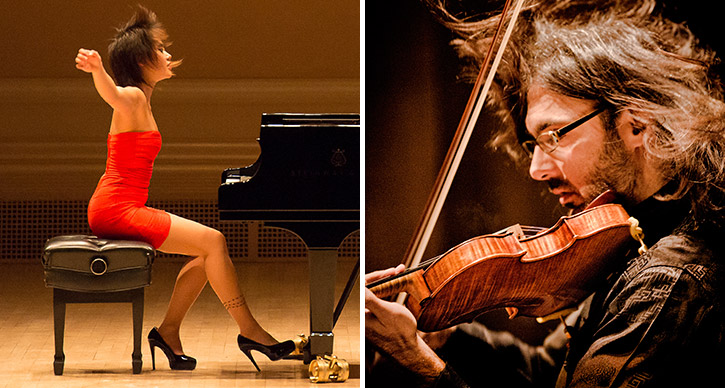
Piano sensation Yuja Wang (left) performs with acclaimed violinist Leonidas Kavakos (right) on November 23, 2014. Photos by Ian Douglas and Marco Borggreve.
We’re very excited for Yuja Wang’s return to Ann Arbor this November, when she’ll perform with the acclaimed Greek violinist Leonidas Kavakos. Yuja last performed in Ann Arbor in a solo recital in 2011, when we had the chance to ask her a few questions.
UMS: You’re often described as a young piano prodigy. How do you think your youth affects your performance?
Yuja Wang: If there is any effect, I think it’s unconscious or subconscious, but the pieces I learned when I was say, before 16, I would never forget, they just stick with you your whole life.
UMS: Can you talk a little about how you put together your programs? What’s your dream program?
YW: Programming is an art and I get inspired by the menus in Japanese restaurants. Variety and unity are key for me now.
UMS: What composer or work do you find most challenging to play? Do you view that as a good thing?
YW: I only play the works in public when I think I can handle it. Playing, perceiving, understanding, internalizing a work sometimes requires a lifetime, it changes when our point of view of life changes, it’s something that stays with your life, something that counts in the end.
UMS: What’s one piece of advice that you could pass on to other young aspiring musicians?
YW: Go with the flow, be creative, transcend to something more cosmic.
Did you attend Yuja Wang’s previous performances in Ann Arbor? Share your thoughts or experiences in the comments below.
From Our Archives: Itzhak Perlman
Violinist Itzhak Perlman returns to Hill Auditorium on September 14, 2014.
Itzhak Perlman made his UMS debut in April 1970 with the Philadelphia Orchestra. From our archives, a backstage photo from his visit during the May Festival in 1993 (that’s UMS president Ken Fischer on the left!):
Interested in more from our archives? Check out our digital archives at umsrewind.org.
This Day in UMS: Jascha Heifetz
Editor’s Note: “This day in UMS History” is an occasional series of vignettes drawn from UMS’s historical archive. If you have a personal story or particular memory from attending the performance featured here, we’d love to hear from you in the comments.
March 14, 1951: Jascha Heifetz in Hill Auditorium
Photo: Charles and Alva Gordon Sink.
We love this photo of first UMS president Charles Sink and his wife Alva Gordon Sink and a promotional sandwich board featuring Russian violinist Jascha Heifetz’s 1951 performance in Ann Arbor.
He first performed in Ann Arbor in 1919, at age 18. He was already a sensation. He was also, as Charles Sink Remembered, “a normal boy interested in everything before him.” Touring the campus before the concert Heifetz wanted to see the medical school, asking, “Do they cut up bodies, and can one see them?” Sink arranged to take him to the anatomy lab, where Heifetz watched intently, asking many questions. To Sink’s relief, the medical students “refrained from their usual practice of dropping stray toes” or other body parts into the pockets of an unwary visitor.
Heifetz returned for many concerts and he always mentioned his Michigan “medical course.”
The Four Seasons Like You’ve Never Heard Them Before…
With next Wednesday’s “Seasons Project” featuring the Venice Baroque Orchestra and violinist Robert McDuffie performing both Vivaldi’s Four Seasons and Philip Glass’s “American” Four Seasons in Hill Auditorium, we thought you might enjoy the video trailer for the concert…
…And the opportunity to identify the seasons from Philip Glass’s concerto. Robert McDuffie says, “I specifically asked Philip Glass for four large movements, originally thinking that we would be naming the movements as seasons — until we both disagreed on what was summer and what was winter. He said, this is a great opportunity actually… why don’t we just leave it up to the audience to decide?”
This Day in UMS History: Albert Spalding (March 16, 1936)
Hill Auditorium
Monday, March 16, 1936
Albert Spalding, violinist
André Benoist, accompanist
This concert caught my eye as having an eerie similarity to the senior recital I just gave a couple weeks ago, on which I played both the Brahms d minor sonata and Corelli’s La Folia, in addition to another Mozart piece in A major (although a sonata, not the concerto…the differences in concert programming between today and the early 20th century could make up an entire blog entry). Albert Spalding was one of those violinists whom I had sort of heard of, but never really knew much about him, so it was interesting to research him.
First, to dispel confusion: he is not the Albert Spalding who was a Hall of Fame baseball pitcher and who founded the sports equipment company. That Spalding (the pitcher) was Spalding’s (the violinist) uncle.
Spalding was American, born in Chicago in 1888, although during his adolescence, his family wintered in Florence. Until the First World War, he followed the typical path of a violinist: studies at the Bologna and Paris Conservatories; the de rigueur meeting with Joseph Joachim; solo performances throughout Europe and the United States. The outbreak of the war caused him to cancel plans for a tour to South America. Instead, he enlisted in the army, serving in Italy and the doing secret service work in Spain. After the war, he returned to the states and married.
However, it’s an episode during the Second World War that really highlights both Spalding and the power of music. During an aerial bombardment of Naples, in which thousands of terrified refugees were huddled in a cave, Spalding “borrowed a violin from a symphony musician he observed in the crowd. As the first the tones of Beethoven Concerto floated unaccompanied through the shelter the cries and moans ceased instantly. By the time the concerto was ended, peace, calm and quiet had been brought, if only for a brief space, to the wretched and unhappy people. Persons present on that occasion have written and stated that they had never heard such a great performance nor had they ever seen the power of music so convincingly illustrated.” (From the liner notes of Albert Spalding Plays Beethoven “Kreutzer” Sonata and Bach Chaconne)
If you’d like to see the original concert program pages, click the thumbnail, which will direct you to the recently launched UMS digital archive hosted by the Ann Arbor District Library. Here you’ll find over 100 years of programs and photos from UMS.
Program:
Corelli: La Folia [Sonata in d minor, Op. 5 #12]
Mozart, Concert in A [#5, K. 219, “Turkish”]
Brahms: Sonata in d minor, Op. 108
Spalding: Prelude (“Wind in the Pines”)
Boulanger: Cortège
Sarasate: Malagueña
Ravel: Habanera
Szymanowski: Tarentelle
This Day in UMS History: Royal Philharmonic Orchestra (Feb 19, 1985)
Editor’s Note: Royal Philharmonic Orchestra performs in Ann Arbor on January 11, 2016.
February 19, 1985
Hill Auditorium, Ann Arbor
Royal Philharmonic Orchestra
Yehudi Menuhin, conductor
“While Yehudi Menuhin’s name is synonymous with the violin, he is also regarded as one of today’s finer conductors.” So begins the biographical note for the concert of this orchestra, which in 1986 counted André Previn as its Music Director and the Queen Mum as its patron. Menuhin’s name is indeed synonymous with the violin, but even for a violinist he had an unusual life. He was raised in California, studied in Europe with Georges Enesco, and as a teenager was an internationally famous violinist. During World War II, he flew, sometimes in dangerous conditions, to military hospitals to perform for wounded soldiers – acts for which France later honored him with the Legion of Honor (making him its youngest recipient). He was a close friend and collaborator with famous Indian sitarist Ravi Shankar (who, still going strong at 90 years old, recently appeared at Hill with his daughter Anoushka) and released joint recordings with legendary jazz violinist Stephane Grappelli. He founded the Yehudi Menuhin School in Surrey, England, received fourteen honorary doctorates, and was made a life peer by Queen Elizabeth II. He died in 1999.
“This day in UMS History” is an occasional series of vignettes drawn from UMS’s historical archive. If you have a personal story or particular memory from attending the performance featured here, we’d love to hear from you in the comments.


